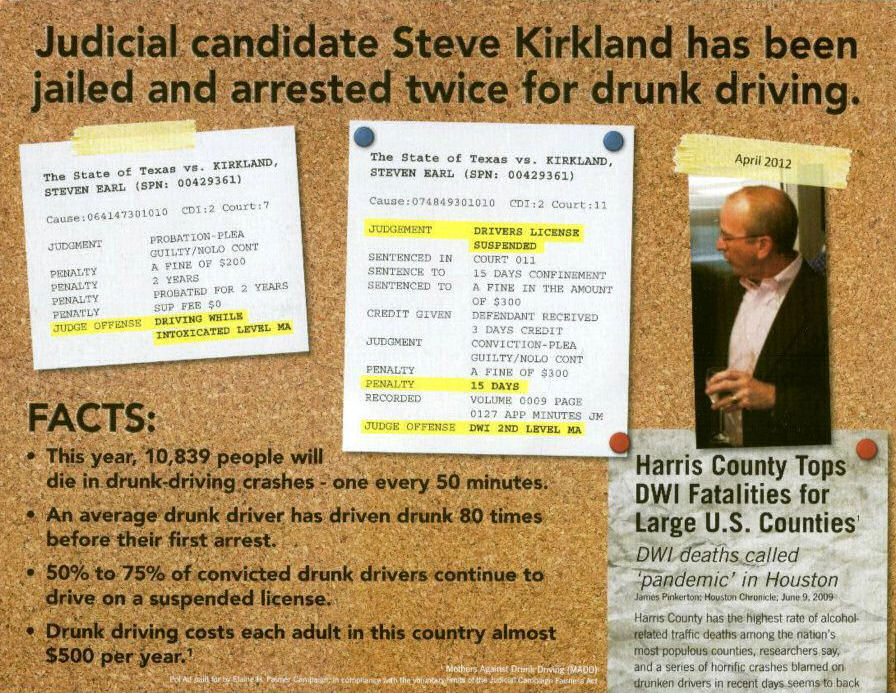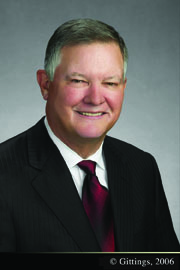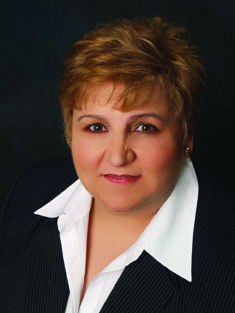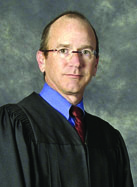
The High Cost of Integrity
An angry litigant who drove Steven Kirkland from the bench surfaces again as Kirkland campaigns for the March 4 primary election.
by Brandon Wolf
Steven Kirkland, the first out and proud member of the Harris County District Court System, understands first-hand the high cost of judicial integrity. Driven from the 215th District Civil Court bench in 2012 by a vengeful litigant, Kirkland is campaigning for the 113th Civil Court judgeship.

Campaign finance reports released on January 15, 2014, confirm that attorney George Fleming, against whom Kirkland ruled in a 2011 mass tort, is once again determined to punish Kirkland through the political process. Fleming is the sole contributor to the campaign of contender Lori Gray.
Fleming heavily funded the primary campaign of Kirkland challenger Elaine Palmer in 2012. The Palmer primary campaign has been described by the Texpatriate political blog as “disgustingly homophobic and borderline slanderous.”
The political consultants and tactical masterminds of the Palmer campaign were Bethel Nathan and his associate Justin Jordan. Nathan died in December 2012. Jordan, however, is listed on Gray’s current financial disclosure report as her political consultant.
The Origin of Fleming’s Vendetta
While serving on the 215th District Civil Court bench, Kirkland oversaw a mass tort involving attorney Fleming. Fleming had earlier won a huge legal victory for a group of clients who suffered adverse effects from the diet pill fenfluramine/phentermine (“fen-phen”). After Fleming ended up taking 54 percent of that judgment, his clients fought back, saying that he had inflated fees which should not have been passed on to them. They filed a breach of contract suit, which ended up in Kirkland’s 215th Civil Court.
In 2011, Kirkland handed down a judgment in favor of the diet pill clients. That judgment, now on appeal by Fleming, could cost him as much as $13 million. Although judicial observers agreed with Kirkland’s judgment, Fleming lashed out with a political vengeance that dropped the jaws of Houston’s political activists.

Anthony Clarkson, Keith Toler, Cristian Rosas-Grillet, and Sireesha Chirala.
Suspicious Activity in the 2012 Primary Race
Fleming’s first scheme was to line up a respected heavy-hitter to oppose Kirkland. Consultant Jordan approached Deborah Norris, a Houston attorney with a stellar academic record and recent construction law awards. She has also been featured on CNN’s “America’s Premier Lawyers.”
Jordan promised Norris he had the financial backing for her to run against Kirkland. But Norris investigated the scenario, and found that Kirkland was considered an “outstanding” jurist. She turned down the offer.
The plot against Kirkland then totally changed in character. Jordan turned to Elaine Palmer, an African-American attorney with no political visibility. Palmer took the bait. A Houston Chronicle endorsement of Kirkland in the primary race noted that Palmer may have been “the unwitting partner to potentially damaging mischief to both Kirkland and the local Democratic Party.”

Dirty Politics
To characterize the campaign that Nathan and Jordan waged as “mischief” is an understatement. Dirty political tricks emerged that sunk lower than anything most local political observers could remember.
Clearly targeting the prime voting group of older African-American women, a series of robo-calls were produced. One call brought back the memory of Chad Holley, an African-American high school sophomore who was arrested in 2010 as an alleged burglary suspect. A video of police kicking and beating Holley, who was lying on the ground, was widely distributed on the local media. The call suggested that only African-American judges could ensure that such treatment would be punished in their courtrooms.

An anonymous homophobic e-mail was broadcast to a targeted audience. Jordan claimed he was not responsible for the attack, but technical analysis of the piece strongly pointed in his direction.
But the centerpiece of Jordan’s campaign was an attack on Kirkland’s sobriety in the last stretch of the race. Robo-calls featured a “breaking news” announcement that Kirkland had been arrested on more than one occasion for driving while intoxicated. Then the mother of two drunken driving victims pleaded for voters to keep Kirkland off the bench.
Kirkland has always been transparent about his past addiction to alcohol, which he struggled with in the 1970s and ’80s. It was in the early ’80s that the DWI arrests were made. None of the incidents harmed anyone, but Kirkland served his sentence and became active in Alcoholics Anonymous. In 2012, he had been sober for 28 years. But the attack ads failed to mention the date of the DWI incidents.
Jordan then introduced the most shocking tactic of the campaign—a direct-mail piece that was mailed to voters citywide. It once again included the DWI incidents, without the dates of occurrence. It also included a photo of Kirkland at a fundraiser holding a fluted glass in his hand. The photo was lifted from a Facebook friend of Kirkland’s, and carefully cropped. Another photo of the event from a different angle shows Kirkland pouring San Pellegrino into the glass. San Pellegrino is an imported mineral water, usually served at events for people who don’t drink alcohol.
Despite a local TV news feature on the dirty politics, the damage had been done, and Kirkland lost the primary on May 29, 2012, 61 percent to 38 percent. The Harris County Democratic Party took no position on the ethics of Palmer’s primary campaign tactics, but the Houston GLBT Political Caucus recommended a “no vote” in the 215th Civil Court race in the general election. On November 6, Palmer won by a narrow margin against the Republican candidate Ken Shortreed, with 50.53 percent of the vote.

Staging a Comeback
Kirkland is now running for the 113th District Civil Court bench, in the Democratic primary to be held March 4, 2014. His announced opponent is Lori Chambers Gray, a Houston attorney who practices criminal law. Gray ran for Harris County Criminal Court 10 in 2010 and won the Democratic primary, but was defeated in the general election.
Gray’s campaign financial report, filed January 15, 2014, shows George Fleming and the Texans for Good Leaders PAC (of which Fleming is the main contributor) as the only sources of her $35,000 campaign war chest. $14,000 of that money has been paid to consultant Justin Jordan.
Her most recent campaign report shows expenditures of $30,000 for design work, campaign signs, campaign sign placement, campaign advertisements, website, photos, voter database, and consulting.

At press time in mid-January, Gray had no campaign website or even a Facebook campaign page. Her only web exposure is a posting to her personal Facebook page by her brother, who congratulates her for entering the current judicial race. She has virtually no visible political identity.
The 2014 off-year elections traditionally have low voter turnout. Given that Gray is African-American, it’s likely that Jordan will target older female African-American voters, a voter bloc known to participate well in off-year elections. Whether or not he will employ another campaign of innuendo and misleading information in the final stretch is purely a matter for speculation.

Reflecting on the Fleming Vendetta
Kirkland admits that the 2012 primary defeat was upsetting. But he was more concerned about the damage it may have done to the recovery program community. “If people see that your one-time addiction can be used against you, after 30 years of sobriety, it’s not very encouraging.”
Kirkland now makes sure he is always holding a bottle of water at both public and private functions. And in the current campaign, he emphasizes his recovery in addition to his qualifications for the office. “I’ve got to get the word out there that I’ve been sober for the last 30 years, in case the issue is used against me again in this campaign,” he told OutSmart magazine in a recent interview.
Looking back on the decision he rendered in the Fleming case, Kirkland says he would have made the same judgment even if he had known the fury it would unleash from Fleming. “I had to do what was right.”

As a man who appreciates the justice system and holds it in high regard, Kirkland says that Fleming’s vendetta is especially disappointing. “Most attorneys enter the arena and take their losses when they come.”
Kirkland says he will continue to promote his qualifications for office. “I’ve worked hard to raise the bar for our judicial system in my 12 years as a municipal and district court judge. I started the Homeless Court, pushed for electronic filing of court documents, and walk the talk on diversity in discretionary appointments.
“I’m an excellent candidate for the bench,” he says. “I’ve seen the justice system from all sides—as a defendant, as a plaintiff, as an attorney, and as a judge.”
___________________________________
SIDEBAR
Good Judgment
Openly LGBT candidates set their sights on Harris County’s judicial system
The March 4 Democratic primary is approaching fast, with early voting starting February 18. These three openly LGBT candidates, who all have Democratic challengers in the primary, are hoping to bring fairness and change to the Harris County judicial system. The

Houston GLBT Political Caucus has endorsed all three of these candidates.
Steven E. Kirkland
District Judge, 113th Judicial District
With 12 years of judicial experience, 24 years of legal experience, and over 30 years of experience working for the community, Steven Kirkland says he has the experience to serve the people “fairly, efficiently, and with compassion.” He received his Bachelor of Arts from Rice University and a Juris Doctorate from the University of Houston’s Law Center. Kirkland previously served as Judge of the 215th District Court and is hoping to make his way back to the bench with this election. (See: The High Cost of Integrity, page 41.)

Jim Evans
Family District Judge, 308th Judicial District
A Native Houstonian, Jim Evans is also a parent, divorced parent, stepparent, and adoptive parent. Evans has over 10 years of law experience, and his practice has recently focused almost exclusively on family law. He holds a Bachelor of Arts from Houston Baptist University, a master’s degree from Southwestern Baptist Theological Seminary, and is a graduate of the University of Houston Law Center. If elected, Evans will be the first openly gay family judge in Texas.

Kim Ogg
Harris County District Attorney
With 26 years of experience in the justice system, Kim Ogg has worked as a prosecutor, defense lawyer, and is a long-time crime victims’ advocate. She served as both the director of Houston’s first anti-gang task force under Mayor Bob Lanier and the executive director of Crime Stoppers of Houston. She holds a Bachelor of Arts from the University of Texas at Austin and is a graduate of the South Texas College of Law. “I will immediately halt the practice of treating economically-disadvantaged criminals differently than others by promising that no one will be above the law in Harris County, regardless of the neighborhood you live in, the size of your bank account, or the uniform you wear,” she says. —Megan Smith











FB Comments